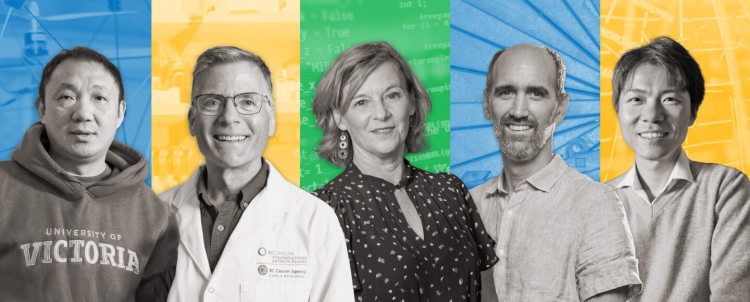
UVic 2025 Royal Society of Canada recipients
RSC celebrates UVic researchers with the country's highest academic honour peer-elected recipients chosen for their academic excellence and their remarkable contributions to the arts, humanities and sciences, and to Canadian public life.
This year's recipients work in the fields of physics and astronomy, civil and mechanical engineering, computer science and medical science. They have been elected fellows of the RSC and members of the College of New Scholars, Artists and Scientists.
To date, well over 100 UVic professors have been elected to the Royal Society of Canada.
New members
Ruobing Dong, Physics and Astronomy
Dong is one of the world's leading young astrophysicists in exoplanet science and has made fundamental contributions to our understanding of planetary origins. He explores how planets form around young stars by studying the signatures of planet formation in their birth cradles. By pioneering a blend of cutting-edge observations, numerical simulations and machine learning, he uniquely bridges the theoretical and observational communities, significantly advancing the field of planet formation.
When we image the dusty disks around young stars, we catch planets in the act of being born. By combining observations from the world's most powerful telescopes with innovative simulations and machine learning, my team traces the faint signatures of newborn worlds and, ultimately, helps answer the timeless question: Where do we come from?"
Ruobing Dong, adjunct professor
Tom Gleeson, Civil Engineering / Earth and Ocean Sciences / Centre for Global Studies
Gleeson is a deeply interdisciplinary and collaborative scholar of groundwater science. He is committed to bridging the gaps between scientific research, resource management and community engagement, with a focus on groundwater sustainability and environmental justice. He loves new ideas and experiences, food and yoga, and helping people and the planet.
Groundwater is invisible yet vital to life. For two decades, I've worked to make the unseen visible and sustain this essential resource. Along the way, I've been fortunate to collaborate with incredible students and colleagues, bridging disciplines, amplifying diverse voices, and creating innovative approaches to water science from local watersheds to the global stage."
Tom Gleeson, professor and President's Chair
New fellows
Brad Nelson, Biochemistry and Microbiology / Lynda and Murray Farmer Immunotherapy Research Chair
Nelson's research focuses on deciphering and engineering the immune response to cancer, with an emphasis on gynecological and lymphoid cancers. He has used advanced genomic and imaging tools to understand how lymphocytes collaborate to recognize and attack human tumours. In parallel, he has co-led innovative clinical trials of genetically engineered cell therapies that seek to transform patient outcomes while ensuring accessibility and affordability within Canada's public healthcare system.
Ever since a close family member was diagnosed with ovarian cancer over 30 years ago, I have focused my research on developing new treatments that harness the amazing ability of the immune system to recognize and destroy tumours. Thanks to my incredible team and the enduring support of our patients and community, we've been able to create innovative immunotherapies that are now helping cancer patients across the country. Immunotherapy has finally come of age, and the best is yet to come!"
Brad Nelson, professor
Yang Shi, Mechanical Engineering
Shi is internationally renowned for his innovative contributions to control theory and its application to intelligent mechatronics, robotics, and cyber-physical systems. His research has improved the control performance of uncrewed vehicles in the air, on land, on and under the sea. For more than 20 years, Shi has continuously developed, expanded and applied an integrated model predictive control framework that makes autonomous vehicles, robots, and internet-linked things in general, more reliable, connected, communicative and efficient. He has transformed modern society through his pioneering integration of technology and engineering principles.
I like the quote there is nothing more practical than a good theory.' I'm inspired by the principle that rigorous theory provides the essential framework and methodologies to guide practical applications toward success. I have been fortunate to have great mentors and am honoured to work with many brilliant students. I look forward to conducting and enjoying more insightful and impactful research for the benefit of the society and humanity."
Yang Shi, professor
Margaret-Anne Storey, Computer Science / Canada Research Chair in Human and Social Aspects of Software Engineering
Margaret-Anne Storey is an international leader in human-centred software engineering research. Recognizing that software is developed by people, for people, she adapts and blends methods from sociology and behavioural sciences to create new knowledge about socio-technical software and its impacts on people. Her discoveries advance academic theories, and she works closely with practitioners to develop practical, scalable tools for the real world.
I'm honoured to receive this recognition from the Royal Society of Canada. It's a reflection of the many incredible collaborators, mentors and students I've had the privilege to work with over the years. I'm especially proud to see the growing recognition of human-centred software engineering, the social and cognitive dimensions of software development, and the evolving impact of AI on how we build and understand software, work that is deeply connected to diversity, inclusion and the broader role of technology in shaping society."
Margaret-Anne Storey, professor
Learn more about the Royal Society of Canada and this year's new fellows and members.













